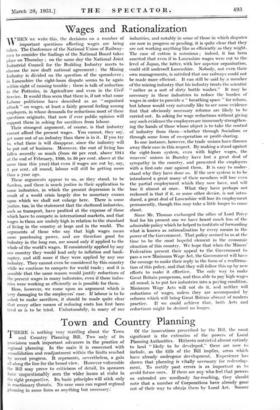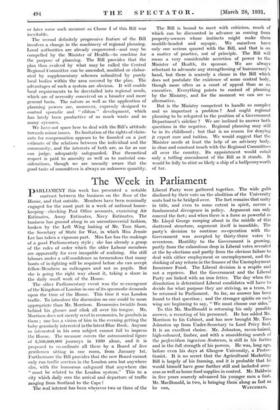Town and Country Plannino- THERE is nothing very startling about
the Town 1- and Country Planning Bill." Two only of its provisions "mark important advances in the practice of regional -planning; In the main it is concerned with consolidation and readjustment within- the limits reached by recent progress. It represents, nevertheless, d gain all along the line for the broad view. - However vulnerable the Bill may prove to criticisms of detail, its sponsors have firignedionably seen the wider issues at stake in the right -perspective. Its basic principles will stick only iii reactionary throats.' -No sane man can regard regional Planning in some form as anything but necessary; • Of the innovations prescribed by the Bill, the most significant is the extension of the powers of Local Planning Authorities: Hitherto restricted almost entirely to land "likely to be developed," these are now to include, as the -title of the Bill implies, areas which have already undergone development. Experience has shown that planning is vitally necessary for redevelop- ment. To rectify past errors is as important as to avoid future ones. If there are any who feel that powers so extended are- needlessly far-reaching, they should note that a number of Corporations have already gone out of their way to obtain them by Local Act. Sooner or later sonic such measure as Clause I of this Bill was inevitable.
The second definitely progressive feature of the Bill involves a change in the machinery of regional planning. Local authorities are already empowered—and may be compelled by the Minister of Health—to combine for the purpose of planning. The Bill provides that the plan thus evolved by what may be called the Central Regional Committee- can be amended, modified or elabor- ated by supplementary schemes submitted by purely local bodies within the area covered by the plan. The advantages of such a system are obvious. It will enable local requirements to be dovetailed into regional needs, which are of necessity conceived on a broader and more general basis. The nature as well as the application of planning powers are, moreover, expressly designed to control sporadic and " ribbon " development, which has lately been productive of so much waste and so many eyesores.
We have not space here to deal with the Bill's attitude towards minor issues. Its limitation of the rights of claim- ants for compensation appears to be founded on a just estimate of the relations between the individual and the community, and the interests of both are, as far as one can judge, adequately safeguarded. Due theoretical respect is paid to amenity as well as to material con- siderations, though we are uneasily aware that the good taste of committees is always an unknown quantity. The Bill is bound to meet with criticism, much of which can be discounted in advance as coming from property-owners whose instincts might make them muddle-headed and myopic. We ourselves have only one serious quarrel with the Bill, and that is on a matter of practice, not of principle. The Bill will mean a very considerable accretion of power to the Minister of Health, its sponsor. We are always reluctant to advocate any strengthening of bureaucracy's hand, but there is scarcely a clause in the Bill which• does not postulate the existence of some central body, though more often as a court of appeal than as an executive. Everything points to control of planning by the Ministry, and for the moment we can see no alternative.
But is the Ministry competent to handle so complex and so important a problem ? And ought regional planning to be relegated to the position of a Government Department's sideline ? We are inclined to answer both questions in the negative. Regional planning may still be in its childhood ; but that is no reason for denying it expert care and tuition. We would suggest that the Minister needs at least the help of an advisory body, in close and constant touch with the Regional Committees all over the country. Its appointment would entail only a trifling amendment of the Bill as it stands. It would be folly to stint so likely a ship of a halfpennyworth of tar.















































 Previous page
Previous page